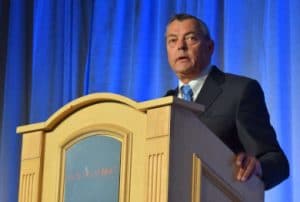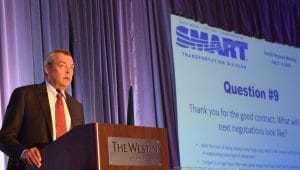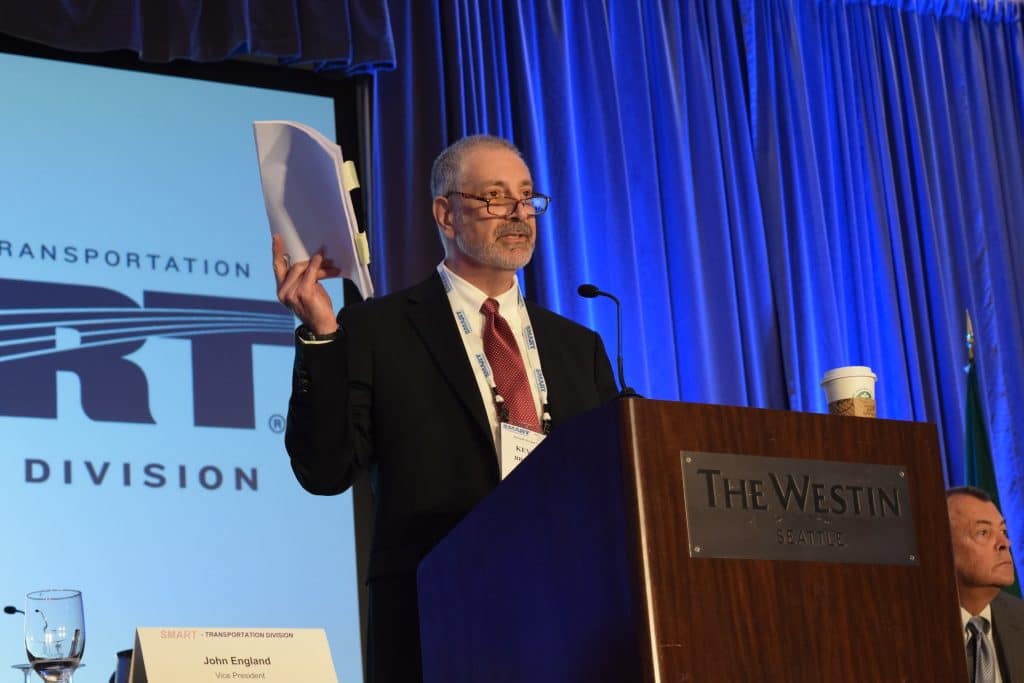SMART Transportation Division President John Previsich supports a rapid resolution to the partial federal government shutdown and fully endorses this message from AFL-CIO TTD President Larry Willis that was sent to U.S. representatives.
January 10, 2019
End this Unnecessary and Harmful Government Shutdown
Dear Representative:
On behalf of the Transportation Trades Department, AFL-CIO (TTD), I urge you to pass H.R. 267, the FY 2019 Transportation and Housing and Urban Development (THUD) Appropriations bill and end the partial government shutdown by passing the remaining spending bills. Another day cannot pass without federal workers returning to their paid work.
As the country approaches the third week of a government shutdown, roughly 800,000 government employees are either working without pay or furloughed with no end in sight. Those numbers do not include the thousands of federal contractors going without pay and who will not likely be retroactively compensated for their loss of work. This Friday, hundreds of thousands of federal workers will miss their first paycheck of the year. This is no longer a theoretical discussion of the effects of a shutdown. Facing post-holiday bills, many workers will have to decide whether they can put gas in their car, pay the bills, or meet childcare or medical expenses. Already, thousands are beginning to apply for unemployment.
Simultaneously, shuttered agencies like the Department of Transportation (DOT) are unable to fulfill their mandates. Many of DOT’s grant making operations have been closed, forcing local and state transportation officials to halt or slow transit, rail, and even road projects until federal funding is guaranteed. In Oklahoma alone, 45 highway projects worth $137 million will be delayed. If the shutdown continues, New York City’s public transit system is expected to lose $150 million per month. Worse, state transportation agencies across the country may be forced to cut maintenance, reduce service, or furlough state workers within their transportation systems to make up for the lapse in federal funding.
The high safety and security standards that we demand and require of our transportation network are also being undermined during this government shutdown. Nearly all staff at the National Transportation Safety Board (NTSB) have been furloughed – stalling accident investigations and causing modal safety recommendations to languish. At the Federal Aviation Administration (FAA), critical aviation safety inspectors and systems specialists are prevented from doing the important work of keeping our skies safe. Air traffic controllers are working without pay, and their training academies have been shuttered, further exacerbating a staffing crisis that has plagued this workforce for too long. Furthermore, federal Transportation Security Administration (TSA) officers are reporting to work assignments that are often understaffed and are facing the added stress of not being paid, through no fault of their own.
TTD’s 32 affiliate unions represent workers in all modes of transportation. We know that consistent and strong federal investment in our transportation network not only keeps us safe, but also spurs economic growth and job creation for all Americans, expands the middle class, and creates mobility options in communities across the country. But these benefits are jettisoned when we halt funding for critical transportation accounts and bring uncertainty to an industry and sector that is so critical to our country. While H.R. 267 and the other spending bills being considered this week may not offer the funding levels we or others would prefer, it should offer a bipartisan compromise framework to get federal employees back to work.
We implore you to end this partial government shutdown now and allow federal workers to go back to serving the American people. On behalf of transportation labor, I urge you to pass H.R. 267 and reopen the nine federal agencies by passing the remaining spending bills.
Sincerely,
Larry I. Willis
President,
Transportation Trades Department, AFL-CIO



 The United Transportation Insurance Association (UTUIA), in a show of fraternal solidarity and generosity, has donated $5,000.00 to the UTU Disaster Relief Fund to be used for SMART TD members who have been negatively impacted by Hurricane Harvey.
The United Transportation Insurance Association (UTUIA), in a show of fraternal solidarity and generosity, has donated $5,000.00 to the UTU Disaster Relief Fund to be used for SMART TD members who have been negatively impacted by Hurricane Harvey.